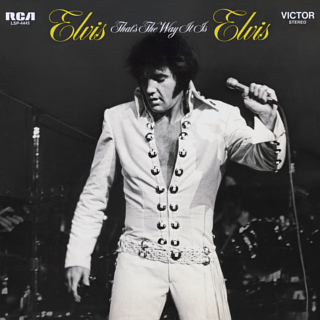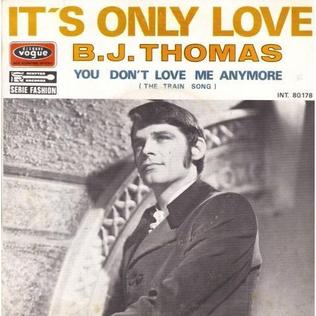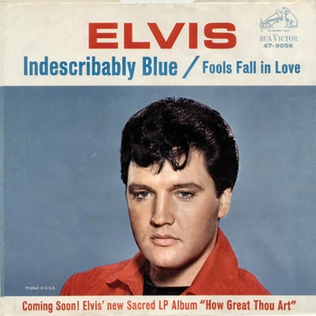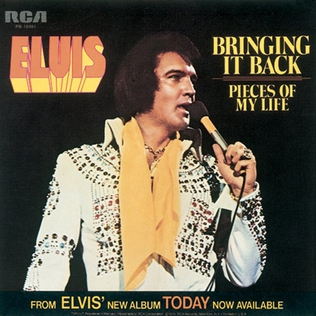Related Research Articles

"Can't Help Falling in Love" is a song recorded by American singer Elvis Presley for the album Blue Hawaii (1961). It was written by Hugo Peretti, Luigi Creatore, and George David Weiss and published by Gladys Music, Inc. The melody is based on "Plaisir d'amour", a popular French love song composed in 1784 by Jean-Paul-Égide Martini. The song was initially written from the perspective of a woman as "Can't Help Falling in Love with Him", which explains the first and third line ending on "in" and "sin" rather than words rhyming with "you".
"I Really Don't Want to Know" is a popular song written by Don Robertson (music) Howard Barnes (lyrics). The song was published in 1953.
"Love Letters" is a 1945 popular song with lyrics by Edward Heyman and music by Victor Young. The song appeared, without lyrics, in the movie of the same name performed by Dick Haymes, and was nominated for the Academy Award for Best Original Song in 1945 but lost out to "It Might as Well Be Spring". The song has been covered by a number of artists, most notably by Nat King Cole (1957), Ketty Lester (1962), Elvis Presley (1966), and Alison Moyet (1987).

Promised Land is the twenty-first studio album by American singer and musician Elvis Presley, released by RCA Records on January 8, 1975. It was recorded in December 1973 at Stax Records studios in Memphis and released on Presley's 40th birthday in January, 1975. In the US the album reached number 47 on the Billboard Top 200 chart and number 1 in Billboard's Top Country LPs chart, as well as the Cashbox Country albums chart. In the UK the album reached #21.

That's the Way It Is is the 12th studio album by American singer and musician Elvis Presley, released on RCA Records, LSP 4445, in November 1970. It consists of eight studio tracks recorded at RCA Studio B in Nashville, and four live in-concert tracks recorded at The International Hotel in Las Vegas. It accompanied the theatrical release of the documentary film Elvis: That's the Way It Is, although it is not generally considered a soundtrack album. The album peaked at number 21 on the Billboard 200 and at number eight on the country chart. It was certified Gold on June 28, 1973, by the Recording Industry Association of America and up-graded to Platinum, for sales of a million copies on March 8, 2018.
"I Love You Because" is a song written and recorded by country music singer and songwriter Leon Payne in 1949. The song has been covered by several artists throughout the years, including hit cover versions by Al Martino in 1963 and Jim Reeves in 1964.

"I've Lost You" is a song written by Alan Blaikley and Ken Howard for Iain Matthews. It was originally recorded in 1969 and released on Matthews' first solo album after leaving Fairport Convention: Matthews' Southern Comfort.

"I'm Leavin'" is a 1971 song by Elvis Presley. It was written by Sonny Charles and Michael Jarrett.

"It's Only Love'" is a 1969 song by B. J. Thomas from his LP Young and In Love. Elvis Presley made the song a top hit in the UK, reaching No. 3 in 1980.

"Almost in Love" is a song recorded by Elvis Presley as part of the soundtrack for his 1968 motion picture Live a Little, Love a Little. Luiz Bonfa had previously released an instrumental version of this tune in 1966 called "Moonlight in Rio".

"Indescribably Blue" is a song written by Darrell Glenn and recorded by Elvis Presley on June 10, 1966. It was released by RCA Records as a single on January 10, 1967, backed with "Fools Fall in Love". The song peaked at No. 33 on the Billboard Hot 100 singles chart on February 24, 1967.
"My Wish Came True" is a song written by Ivory Joe Hunter and originally recorded by Elvis Presley with backing vocals provided by The Jordanaires. It reached number 12 on the Billboard Hot 100 in 1959.
"I've Got a Thing About You Baby" is a song by Tony Joe White, released in 1972 as a single from his album The Train I'm On. It was notably covered by Elvis Presley.

"Bringing It Back" is a song written by Gregg Gordon and originally recorded by Elvis Presley for his album Today.
"Pieces of My Life" is a song written by Troy Seals. It was originally recorded by Charlie Rich and appeared on his 1974 album The Silver Fox.
"Your Time Hasn't Come Yet, Baby" is a song written by Joel Hirschhorn and Al Kasha and recorded by Elvis Presley for the 1968 motion picture Speedway. It was sung by Presley in the movie and also appeared on its soundtrack album.
"Patch It Up" is a song written by Eddie Rabbitt and Rory Bourke and originally recorded by Elvis Presley. He released it as a single, with "You Don't Have to Say You Love Me" on the opposite side, in October 1970.
"The Elvis Medley" is an Elvis Presley medley arranged and produced by David Briggs. The track opened the eponymous LP released in 1982.
"King of the Whole Wide World" is a song written by Bob Roberts and Ruth Batchelor and originally recorded by Elvis Presley for the 1962 United Artists motion picture Kid Galahad. The track opened the 6-track soundtrack EP released in August 1962 to coincide with the film's premiere.

"Just Tell Her Jim Said Hello" is a song originally recorded by Elvis Presley with backing vocals provided by The Jordanaires. It was written by Jerry Leiber and Mike Stoller. It reached number 55 on the Billboard Hot 100 in 1962.
References
- ↑ "Elvis Presley". Billboard .
- ↑ "Elvis – I've Lost You (Rockaway Pressing, Vinyl)". Discogs . July 1970. Retrieved 2021-02-10.
- ↑ "Elvis Presley Chart History (Hot 100)". Billboard. Retrieved 2019-01-16.
- ↑ "Elvis Presley Chart History (Hot Country Songs)". Billboard. Retrieved 2019-01-16.